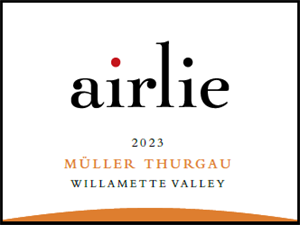Explore Oregon Wines: Wineries | Varietals | AVAs | Cellar 503 Selections

Airlie Winery 2023 Muller Thurgau
A Tale of Two Ladies
The story of Airlie is a story of two women, each of whom has a very similar tale about how they ended up in this beautiful little spot in the Willamette Valley.
It starts with Mary Olson. She was a high-powered telecom executive from Wisconsin, one of very few women. She traveled the country until her employer dropped her in Oregon. Before long, she was telling friends, “when I’m reincarnated, I’m coming back as a winemaker in Oregon.” Soon enough, her impatience won out and she decided to make it happen in this life. She bought Airlie and got busy driving a tractor and working the land.
For Elizabeth Clark, it was an accidental road trip to Oregon with nothing but a plan to visit a cousin. A math major with a Russian minor from a small college in Maryland, Elizabeth fell in love with the wine in the Willamette Valley. From cellar rat to winemaker in just five years!

Cellar 503 Tasting Notes

Airlie Winery, Monmouth, Oregon
2023 Muller Thurgau
This crisp and fruity Riesling cross is a showstopper. Aromas of honeysuckle, Meyer lemon and blossom with touches of mango lead into flavors of ripe pineapple and citrus zest. With a touch of fruit driven sweetness, this wine pairs well with just about everything.
Winemaking Notes: The grapes were hand harvested and immediately pressed off to minimize skin contact. Pressing decisions are done by taste and the cycle was stopped at just over one bar of pressure to minimize potential phenolics. After pressing, the juice settled for several days before being racked and inoculated. Fermentation temperatures were kept at 52° to 55°F and lasted about three weeks until the wine tasted balanced. The wine was cold stabilized and after crossflow filtering, bottled under screwcap in February 2024.
Harvest Notes: 2023 started off quiet with the cool spring pushing budbreak out to early May, then a few days of 90°F plus weather and the vines were popping. 10 days later there was almost an inch on growth on the vines and we hit mid bloom in early June. That’s fast moving for our vines. The warm summer had us looking at an early harvest but some cooling and light rains in September slowed down ripening and, after a quick and slightly frenetic start, harvest stretched out until mid-October. The cool weather helped maintain acid levels in the fruit and the wines are lively and well balanced with good aromatics and aging potential.
Our estate vineyard, Dunn Forest, is LIVE certified sustainable and Salmon Safe. The vineyard is hand cultivated allowing us to respond to individual vine needs.
CELLAR SELECT, Oregon Wine Press, August '24 Issue
Back to School
Müller-Thurgau is a white grape variety (sp. Vitis vinifera) which was created by Hermann Müller from the Swiss Canton of Thurgau in 1882 at the Geisenheim Grape Breeding Institute in Germany. It is a crossing of Riesling with Madeleine Royale. It is used to make white wine in Germany, Austria, Northern Italy, Hungary, England, Australia, the Czech Republic, Slovakia, Slovenia, New Zealand, Canada, the United States, Belgium and Japan. There are around 22,201 hectares (54,860 acres) cultivated worldwide, which makes Müller-Thurgau the most widely planted of the so-called "new breeds" of grape varieties created since the late 19th century. In 2007, the 125th anniversary was celebrated at the Geisenheim Grape Breeding Institute.
When Dr. Müller created the grape in the Geisenheim Grape Breeding Institute in the late 19th century, his intention was to combine the intensity and complexity of the Riesling grape with the ability to ripen earlier in the season that the Silvaner grape possesses. Although the resulting grape did not entirely attain these two qualities, it nonetheless became widely planted across many of the German wine-producing regions.
By the 1970s, Müller-Thurgau had become Germany's most-planted grape. A possible reason for the popularity of this varietal is that it is capable of being grown in a relatively wide range of climates and soil types. Many of these vines were planted on flat areas that were not particularly suitable for growing other wine grapes because it was more profitable than sugar beet, which was the main alternative crop in those locations. The vines mature early and bring large yield quantities, and are less demanding as to planting site than for example Riesling. Müller-Thurgau wines are mild due to low acidic content, but nevertheless fruity.
Müller-Thurgau is also known as Rivaner (Austria, Germany, Luxembourg, and especially for dry wines), Riesling x Sylvaner, Riesling-Sylvaner, Rizvanec (Slovenia) and Rizlingszilváni (Hungary).
A Cellar 503 selection in September 2024, Back to School Willamette Valley | Müller-Thurgau
